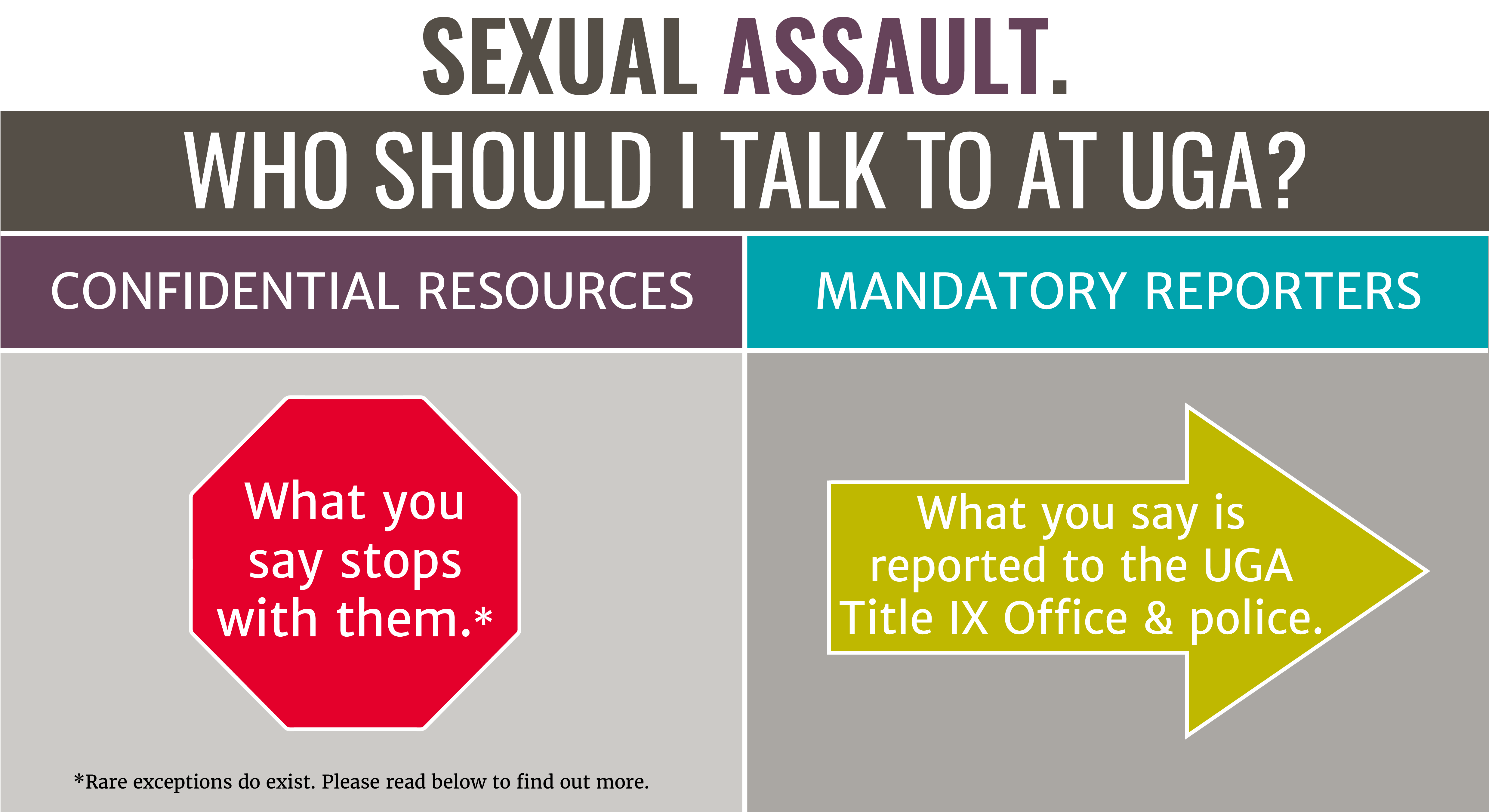Who Should I Talk To?
Sexual Assault Resources at UGA: Confidential vs. Non-Confidential
No one should ever have to experience sexual assault, but it does happen. And it can be incredibly difficult to deal with your everyday life and the trauma afterwards.
It can also be difficult to navigate the different resources that are available on campus at the University of Georgia. An important first step is to know who you can speak to confidentially, as the majority of faculty and staff on campus are required to report information about sexual assault to University officials.

The following is a breakdown of who is and who is not confidential on campus. A general flyer with these lists can be downloaded here.
If you have any questions, know that you can always call RSVP (Relationship and Sexual Violence Prevention and Advocacy Services). We have trained, confidential advocates who are here to answer your questions, explain your options, or just listen. RSVP services are made possible by The Fontaine Center.
24/7 RSVP Hotline: 706.542.SAFE (7233)
Confidential Resources
Anyone who is a confidential resource will keep anything you reveal to them completely private and will not report any identifying information or details to either UGA or Campus Police.
Confidential resources on campus include:
- Relationship and Sexual Violence Prevention and Advocacy Services Office (RSVP)
- UGA Ombudspersons
- Student Care and Outreach
- Counseling and Psychiatric Services (CAPS)
- Psychology Clinic
- Center for Counseling & Personal Evaluation
- ASPIRE Clinic
- University Health Center (UHC) Primary Care Clinics
An important part of recovering from trauma is being in control of your own story. Whether you want to officially report the incident or not, these resources can help do the following:
- EXPLAIN your options
- PROVIDE you with resources
- ANSWER your questions
- Help YOU decide what to do next
There are a few exceptions to the confidentiality of some of these resources. UHC Clinics are required by law to contact the UGA Police to report non-accidental injury if there are visible injuries, but survivors are not required to speak with the police. RSVP, Student Care and Outreach, and the UGA Ombudspersons may need to report identifying information to the UGA Title IX Coordinator in cases of serial offenders or if there is an immediate threat to an individual or the campus community. In these cases, survivors can decline to participate in an investigation.
Non – Confidential Resources
Non-confidential resources are here for you and want to support you. However, if you disclose a sexual assault to someone in any of these offices or positions, they are required to report it to the Title IX Office and/or UGA Police, which can lead to an unwanted investigation of the incident.
Non-confidential resources on campus include, but aren’t limited to:
- University Housing
- Resident Assistants (RAs)
- Office of Student Conduct Staff
- Club, rec, or UGA team coaches
- Student Affairs Staff
- Academic Advisors
- UGA faculty and instructors
- UGA grad student employees (including TAs)
- UGA Police
- Equal Opportunity Office (EOO) and the Title IX Coordinator
It is best to consider all UGA faculty and staff non-confidential unless designated confidential, and it is always okay to ask if you are not sure.
Great questions to ask would be “Are you a confidential resource?” or “Are you required to report anything I tell you to the University or the police?” If you told your story to a non-confidential resource and an investigation was started, know that you do not have to cooperate with the investigation if you do not want to.
For more information on sexual assault resources on campus at UGA, visit RSVP online.
